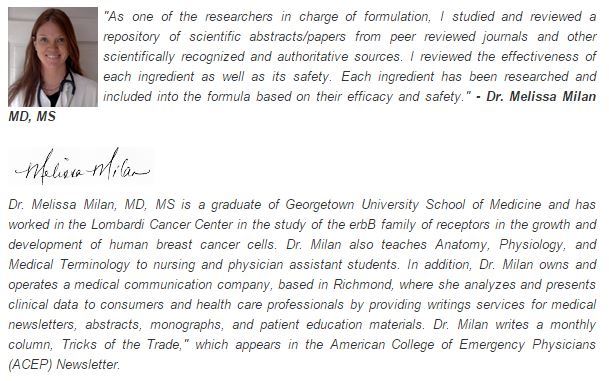Information on Hair Loss
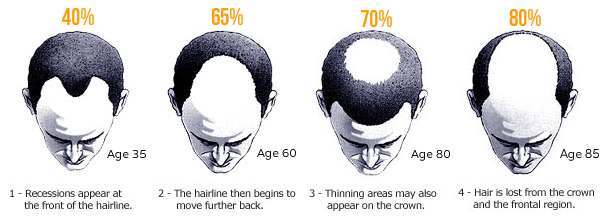
Both men and women are susceptible to hair loss. Often hair loss is not noticeable until the mid 40's, but it is not uncommon for people to experience hair loss in their 20's or even late teens. Over 65% of men and 80% of women will experience noticeable hair loss by age 60.1
Hair loss can be very uncomfortable for many people and it has a strong impact on their quality of life. In the year 2014, there were over 55 million men and women suffering from hair loss in the U.S. alone. Many people turn to increasingly complex treatments, including side-effect laden drugs and painful surgeries, many of which are often 99% ineffective. Due to the prevalence of this condition and the high cost of its treatment, there is a growing number of people turning to natural and alternative methods to combat their hair loss.
What Is Hair Loss?
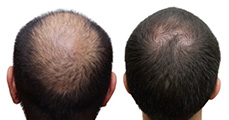
As we age, our follicles become less effective at retaining and producing new hairs. This can happen for a variety of reasons. Changes in hormone levels as we age, dietary deficiencies, genetics, and even just daily stress can lead to chronic hair loss. Hair loss can be difficult to treat due to the wide range of factors that cause it.
The scientific term for hair loss is alopecia. The most common variety of hair loss is known as androgenic alopecia, or male and female pattern baldness (MPB and FPB).
Hair grows out of tiny holes in the scalp known as follicles. Hair loss is usually the result of the follicles shrinking, which makes them less effective at holding on to the hair. The reduced size of the follicles in turn makes it harder for new hair to replace the the ones that have fallen out. The follicles are still living, but they lose their ability to produce new hair. The key to an effective hair loss treatment is finding a way to re-activate the shrunken follicles.
The Characteristics and Symptoms of Hair Loss
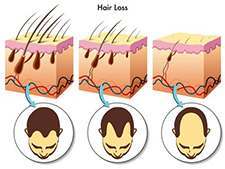 There are many different kinds of hair loss. Aside from male and female pattern baldness there are other types of alopecia including alopecia areata, which is an autoimmune condition that causes random patches of hair loss on the scalp, and an extreme form known as alopecia universalis which causes hair loss across the entire body.
There are many different kinds of hair loss. Aside from male and female pattern baldness there are other types of alopecia including alopecia areata, which is an autoimmune condition that causes random patches of hair loss on the scalp, and an extreme form known as alopecia universalis which causes hair loss across the entire body.
Another commonly experienced type of hair loss is called telogen effluvium. Hair growth occurs in three phases; the anagen phase, which is the main growth phase of the hair, the catagen phase, where the follicle shrinks and begins to push the hair outward, and the telogen phase, where the follicle goes into a 'resting state' that stops hair growth and allows the old hair to fall out and new hair to grow. Ordinarily 10 to 15% of the hair is in the telogen phase at one time. Telogen effluvium, which can be triggered by episodes of trauma or intense stress, can cause up to three quarters of the hair on the head to enter the telogen phase and begin to fall out.2
What are the Causes of Hair Loss?
 Because there are so many different factors that can lead to hair loss, it is often difficult for doctors to pinpoint the exact cause. One primary cause is an over abundance of DHT (dihydrotestosterone), a hormone related to testosterone which causes the follicles to shrink. As we age, testosterone in the body is turned into DHT by an enzyme called 5-alpha-reductase. Androgenic alopecia becomes more common in older populations as more testosterone is converted to DHT. Despite the fact that testosterone if thought of as a "male" hormone, this is a significant cause of hair loss in women as well.
Because there are so many different factors that can lead to hair loss, it is often difficult for doctors to pinpoint the exact cause. One primary cause is an over abundance of DHT (dihydrotestosterone), a hormone related to testosterone which causes the follicles to shrink. As we age, testosterone in the body is turned into DHT by an enzyme called 5-alpha-reductase. Androgenic alopecia becomes more common in older populations as more testosterone is converted to DHT. Despite the fact that testosterone if thought of as a "male" hormone, this is a significant cause of hair loss in women as well.
Symptoms of hair loss can originate from many different systems throughout the body. These include the kidneys, the liver, and the circulatory system. The main factors that contribute to hair loss are:
- 1. Genetics
- 2. Oxidative Stress
- 3. Nutrient Deficiencies
- 4. Hormone Imbalance
What are Common Hair Loss Treatments?
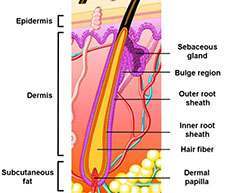
There are many approaches to treating hair loss, raging from changes in diet to prescription medication to painful surgery. Many medications that are prescribed for hair loss have only limited effectiveness compared to their side effects, and hair loss will resume when you stop taking the the drug. While surgical procedures can provide longer lasting results, they can be quite painful and involve many costly operations. There are many supplemental options that are available as well, that use natural ingredients to approach hair loss in a holistic manner, treating the internal causes at their source. There are numerous ways to address chronic hair loss. Not everyone is a suitable candidate for all kinds of treatments, but here is a list of the most prevalent ones:
1. Pharmaceuticals - There are two commonly prescribed drugs that are approved by the FDA to treat hair loss. Minoxidil, popularly known as Rogaine is an over-the-counter liquid treatment that is rubbed into the scalp to stimulate new growth. It may take up to 12 weeks for the effects of Monoxidil to be seen and it may result in unwanted hair growing in nearby areas.
The second drug is a pill called Finasteride, also marketed under the name Propecia. The primary effect of Finasteride is to stop hair loss, but some patients see new hair growth as well. While the FDA does approve this drug they do warn that it may increase the risk of certain types of cancer, and should be avoided by women who are trying to conceive.
2. Surgery - There are two commonly used surgical procedures to treat hair loss. The first is the hair transplant technique, where tiny bits of hair producing skin, known as plugs, are removed from areas with plenty of hair implanted in bald areas. This technique may require multiple transplanting sessions if the size of the hairless area continues to grow.
The other procedure, known as scalp reduction involves surgically removing areas of hairless scalp and extending hair producing skin over those areas. While often successful, these procedures are usually quite expensive and carry with them the risk of infection and scarring. 3
3. Natural Supplements - Due to the expense and risks associated with many drugs and procedures, people have been increasingly turning towards natural remedies to treat their hair loss. Often times hair loss can be a result of diet, stress, or nutritional deficiencies. Clinical studies have shown that deficiencies in Zinc, Vitamin B12, and various amino acids can cause advanced hair loss, and that there are many herbs and minerals that can stimulate hair growth and contribute to overall health and well-being. When coupled with an active lifestyle and a well-balanced diet, taking a quality dietary supplement can often help reverse hair loss and prompt new growth.
References:
1 - National Hair loss Statistics
2 - The American Hair Loss Association: Education, Research, Commitment


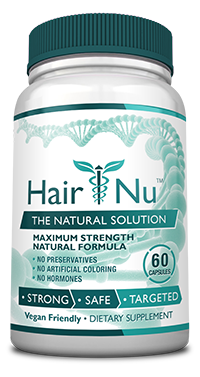




 HairNu™'s formulation of effective ingredients and strong name recognition have brought praise from both customers and health professionals alike. To learn more about the research and data behind HairNu™ , please visit our "
HairNu™'s formulation of effective ingredients and strong name recognition have brought praise from both customers and health professionals alike. To learn more about the research and data behind HairNu™ , please visit our "

